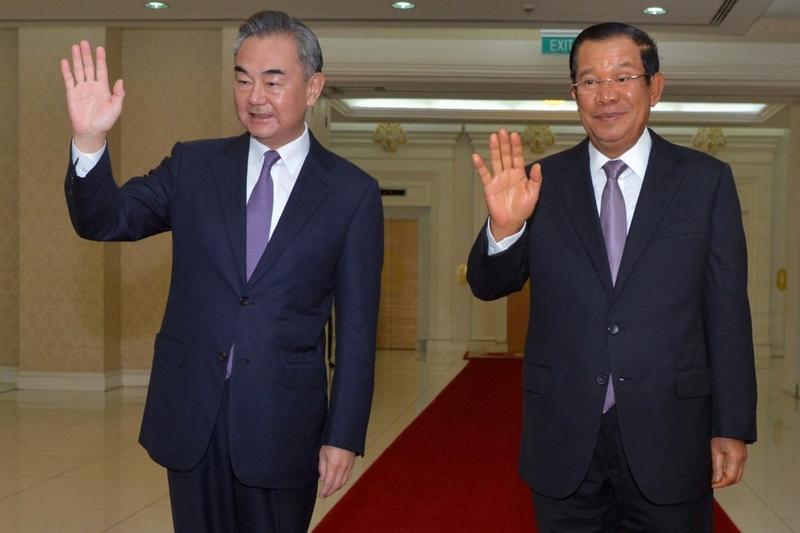 Cambodia's Prime Minister Hun Sen (right) and China's Foreign Minister Wang Yi wave during a meeting at the Peace Palace in Phnom Penh on Oct 12, 2020. (PHOTO / AFP)
Cambodia's Prime Minister Hun Sen (right) and China's Foreign Minister Wang Yi wave during a meeting at the Peace Palace in Phnom Penh on Oct 12, 2020. (PHOTO / AFP)
PHNOM PENH - Chinese State Councilor and Foreign Minister Wang Yi's trip to Cambodia and other Southeast Asian countries would further strengthen China-ASEAN ties and anti-COVID-19 cooperation as well as contribute to maintaining peace and stability in the region, Cambodian officials and experts said on Monday.
Cambodian government chief spokesman Phay Siphan expressed his sincere thanks to China for forging the FTA with Cambodia, saying that the kingdom would greatly benefit from it
Wang concluded his two-day official visit to Cambodia on Monday afternoon. Cambodia is the first leg of his Southeast Asia tour, which will also take him to Malaysia, Laos and Thailand, with a transit visit in Singapore.
In Phnom Penh, he met with Cambodian Prime Minister Samdech Techo Hun Sen and witnessed the signing of China-Cambodia free trade agreement (CCFTA) and other documents on bilateral cooperation.
Apart from the talks, Wang also interacted with Cambodian Deputy Prime Minister and Foreign Minister Prak Sokhonn as well as Deputy Prime Minister Hor Namhong, co-chair of the Cambodia-China Intergovernmental Coordinating Committee.
ALOS READ: Wang Yi proposes initiative to resolve Gulf security issue
CCFTA to provide great benefit to Cambodia
Cambodian Minister of Commerce Pan Sorasak said it was the first-ever bilateral free trade agreement for Cambodia.
"The signing of this agreement signifies an even stronger ties between the two countries and marks another key historical milestone for Cambodia-China relations," he said before the virtual signing ceremony.
"Undoubtedly, the agreement would provide a more robust economic partnership through higher degree of market access and liberalization for goods, services and investments," he said.
The two countries launched the negotiations for the FTA in January this year.
Cambodian government chief spokesman Phay Siphan expressed his sincere thanks to China for forging the FTA with Cambodia, saying that the kingdom would greatly benefit from it.
"The FTA will contribute to boosting Cambodia's economy and improving the livelihoods of the Cambodian people because it will give greater market access to Cambodia's products," he told Xinhua.
Two-way trade between the two countries stood at US$9.42 billion in 2019, according to the Chinese Embassy in Cambodia.
Chheang Vannarith, president of the Phnom Penh-based Asian Vision Institute, said under the CCFTA, Cambodia will have more opportunities to expand its export market to China, especially for agricultural products.
"The pact will also help Cambodia attract more foreign direct investments from China and other countries," he told Xinhua. "But Cambodia needs to increase its productivity and production, and improve the quality and standard of its products."
Kin Phea, director general of the International Relations Institute of Cambodia, said the bilateral FTA will provide Cambodia with greater market access that will ultimately lead to stronger trade and investment ties between the two countries.
"The agreement will importantly contribute to building a community with a shared future for Cambodia and China," he said. "More jobs are expected to be generated from the CCFTA."
Joseph Matthews, a senior professor at the BELTEI International University in Phnom Penh, said the agreement will send a powerful message to friends near and far that Cambodia has expanded its access to the Chinese market with a population of more than 1.4 billion.
"I think that there is a huge opportunity for the kingdom to increase the number of its products being sent to the world's second-largest economy," he said. "The CCFTA will enable Cambodia to attract medium-sized Chinese manufacturers to invest in Cambodia and allow those companies to supply their products to large-scale companies in China."
Heightening China-ASEAN ties, anti-pandemic cooperation
Siphan said Wang's visit clearly reflected China's commitment to further promote its ties with Cambodia and other Southeast Asian countries in light of the unprecedented global challenges of the COVID-19 pandemic.
"His visit will provide further momentum to the relations between Cambodia and China in particular and between China and the Association of Southeast Asian Nations (ASEAN) in general," he said. "It also illustrates China-ASEAN concerted efforts in addressing the pandemic and in restoring economies during the post-COVID-19 era."
The spokesman said Wang's trip also showed China's steadfast commitment to build a China-ASEAN community with a shared future.
"It will further strengthen mutual trust and confidence between China and ASEAN, which are the key factors to maintain peace, security and stability in the region," Siphan said.
Vannarith said the visit demonstrated China's commitment to strengthen China-ASEAN relations in the collective fight against the pandemic as well as to further deepen political trust and economic cooperation.
READ MORE: Wang Yi meets with Philippine, Iranian foreign ministers
"ASEAN has become the top trading partner of China this year, which is the first time in the history of China-ASEAN economic ties. Therefore, ASEAN in the eyes of China constitutes increasing significant role in China's future," he said, adding China-ASEAN relations will be further enhanced after the visit.
Kin Phea said Wang's Southeast Asia trip will help boost the friendly and increasingly close relations between China and ASEAN, and it highlights joint efforts in fighting the COVID-19 pandemic.
"China plays a very important role in dealing with this global pandemic and economic recovery," he said. "The visit is also made in a timely manner to place the importance of commitment to maintain peace, security and stability in the South China Sea."
Matthews believed the visit reaffirmed that China always stands up and stands by its friends in all situations and circumstances.
"I think that the outcome of Wang's Southeast Asia tour will go a long way to develop and strengthen the geopolitical and strategic partnerships between China and ASEAN, against the backdrop of the US bullying tactics in the South China Sea," the professor said.


